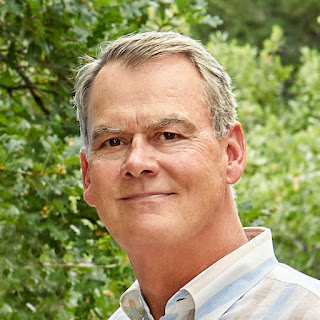Patricius noticed a group of four young men travelling together. They had tonsures and wore the coarse brown habits of monks. They were so thin that their shoulder blades stuck out prominently under their clothes. They carried nothing with them. The sky was sapphire and the sun shone brightly, making Patricius blink. It was only the middle of February but already the wayside was full of heavily scented yellow tree blossoms. Suddenly one of the monks collapsed. Someone shouted and the travellers stopped. The man was carried to some shade under a tree and given some water.
“He’ll be all right soon,” one of his fellow monks maintained. “It’s just a dizzy spell. He’ll be fine in an hour or so.”
“I’m sorry, but we cannot wait for him,” the leader of the caravan stated. “We must continue, but if you wait until tomorrow, another group will be coming, and you can join them.”
“Yes, of course. You must continue. We shall rest until tomorrow.”
“Will you be all right alone?” Patricius asked. “Have you food, water and blankets? I cannot see your bags.”
“We’ll be fine, don’t worry. We have travelled far but have nearly reached our destination. We don’t need food.”
Patricius saw blood around the man’s gums. “No. You don’t look well. I’ll stay with you; I have enough for all of us.” Patricius then spoke to the other travellers. “Continue,” he said to them. “I shall stay here with these four men.”
Whilst the caravan disappeared in the distance, Patricius started gathering wild sage. He gave the four monks some leaves to chew on and then put the rest in a pot with some water. He made a small fire to boil the water. Unpacking his bags, he pulled out a blanket to make the monk, who had fainted, more comfortable.
“Make him drink more water,” he told one of the men. “One sip at a time. Drink yourselves, also. Here is some bread. Chew it slowly. Your stomachs are not used to food; you have fasted for too long. Your gums are bleeding. The sage will help. Soon the sage tea will also be ready.”
“Thank you. You are a good man. Are you a medicus?”
“Oh goodness, no! I lived in Hibernia for six years and worked as a shepherd. The man who taught me, Daithi, often had toothache. He used to chew sage leaves and drink sage tea. He said that the druids had told him to do so, and that it helped. So I hope it will stop your gums bleeding. When the tea is ready, don’t swallow it immediately, but swill it around in your mouths first.”
The sun went down; the sky was streaked indigo and grey. The monks shivered. Patricius gathered more wood for the fire, and they sat down around it.
“You said you had journeyed far. Where do you come from?” Patricius asked.
“We’ve come from Achaia and are going to the island of Lerinus. It’s not much further now.”
“Lerinus? I’ve never heard of it. Where is it?”
“It’s just a small island, off the coast from Canua.”
“Why do you want to go there?”
“We want to join Honoratus who has founded a monastery there.”
“Oh, that’s interesting. Tell me more. Who is Honoratus?”
“Well, he’s the son of a Roman consul and was born in the north of Gaul. He and his brother converted to Christianity. They embarked on a journey to visit the holy places of Palestina and the laurae of Syria and Aegyptus. But his brother died, and Honoratus had to return. He came here, to the south of Francia. In Fréjus, Honoratus was ordained priest by the bishop, Leontius. Honoratus wanted to live a simple life, as a hermit in solitude, and Leontius persuaded him to take up his abode on the island of Lerinus. It was in his diocese. Many Christians, priests and theologians, heard about the island and have followed Honoratus there. He’s been there two years now and it is already known as a religious centre.”
“What about the people who already lived there, did they have to leave?”
“Oh, no! The island was uninhabited. Nobody wanted to live there. It was infested by snakes. You couldn’t put your foot on the ground without treading on one.”
“Ugh, that’s horrible! Did Honoratus get rid of the snakes?”
“I expect so, but it is not important to us. We want to live the austere life he is teaching and study Christian beliefs.”
“I believe in God. There are many questions I have. Maybe Honoratus can help me. May I come with you?”
“Honoratus turns nobody away, but it is not a luxury, everyone must work.”
“Of course. I’m used to manual work, that doesn’t bother me.”
In the night it started to rain, extinguishing the fire.
“I think we should start moving,” Patricius said. “We should go to the next tavern and shelter.”
“But isn’t it too dangerous to travel alone?” one of the monks asked.
Patricius studied the four thin, bedraggled men with no bags. They were in a truly sorry state.
“If thieves see us on the road, I think they’ll wait for more worthwhile victims.” Patricius smiled. He held out his hand to help a monk up from the ground. The monk’s bones were so thin that Patricius was scared to grip him tightly lest the bone crumble beneath his fingers. Their feet and shins looked like those of skeletons. They set off along the road. Moving kept them warmer, and after just seven miles they reached a tavern. Patricius held the door open for the monks but they didn’t want to enter.
“You go in, we’ll wait outside.”
“Either we all go in, or none of us.” Patricius replied. “Come on, we’ll get some breakfast. Don’t worry, I’ll pay.”
“It’s not that…” the monks dithered.
“For goodness sake, come in now!” Patricius ordered. “It’s all very well fasting, but you look as if you’ll drop dead any second now. I thought you wanted to go to Lerinus.”
The monks entered the tavern and they all sat down at a table. The innkeeper brought them hot soup, bread, wine and water. It was a humble meal but they warmed up inside and their clothes dried. The monks thanked Patricius and one of them tried to explain their hesitancy.
“We are ascetics. It is our way of life to forego sensual pleasures, in order to pursue spiritual goals. We renounce material possessions and fast to meditate upon religious matters.”
“That’s all very well,” Patricius answered, “but our bodies need food and water to live. Without these basic needs you will die. Wouldn’t it be better to live and support people who need help?” As Patricius spoke, an idea started forming in his mind. An idea how to spend the rest of his life: helping people less fortunate than himself and spreading the word of Christianity.
































